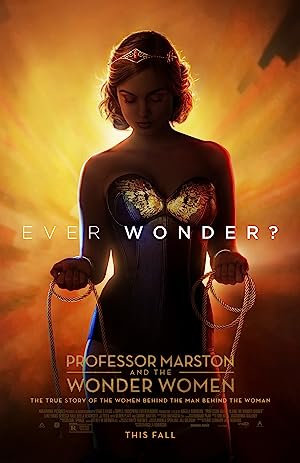When I saw the trailer for Professor Marston and the Wonder Women, I was tempted to see it in theaters. The timing for release is perfect—it opened in the fall of 2017 subsequent to Wonder Woman’s explosion as a summer blockbuster. Luke Evans is a good actor, but he has yet to find the right movie to showcase his talents. I’ve been a Rebecca Hall fan for some time, but her career has receded, and she has seemed content to work on smaller, independent films. (Also she is part black, but I have no idea how she identifies). Mixed reviews, life and Marston family disapproval held me back. If I had known that a black woman directed it, I may have cleared my schedule.
Professor Marston and the Wonder Women is a mixed bag. It is an unauthorized historical biopic about a polyamorous trio who were forced out of academia for their affair and had to find other ways financial support themselves and promote their ideas. I hated the narrative structure, particularly the use of a faux trial to vindicate someone’s life. The movie is usually able to make two of the three main characters interesting, but rarely simultaneously. Someone is always the audience while the other two plays. In the beginning, Elizabeth Marston, the wife and genius in her own right, took early center stage as the dynamic, ballbuster, frustrated intellectual who is afraid of her own desires, is more practical and willing to accept and parrot condemnation. The student, Olive Byrne, played by Bella Heathcote, seizes the momentum early in the first and second part. Olive is a tricky role to play because even though she is stunned by the married couple’s intensity, she is in her own right more revolutionary in her innocent pursuit of them and discovering what she wants. She exhibits none of this coy, mischievous, hypersexualized nonsense from 50 Shades trailers. She rapidly overtakes the two in discovery. To be fair, she seems more attracted to the Mrs. than the Mr., which history seems to vindicate. Evans as the titular character does not hit his stride until the end. He is eager to erase his hangups, but uses intellectual excuses to add a veneer of respectability to his fun. He likes to play big, and he finally gets to do so during the denouement. I suspect that he would be perfect on Broadway.
The relationship is equal parts intellectual and physical and seems credible, not pervy, in its openness. Olive is revolutionary in application. Elizabeth is intellectually revolutionary. The husband acts as a bridge to stop the wife from running away from her fears. The trio works because they are able to accurately call each other out on their crap and tackle some difficult truths without necessarily negating the other’s position. “Your heart pumps a record of the truth.” Professor Marston and the Wonder Women simultaneously seems too slow and too rushed. Suddenly everyone is under one roof with children. The persecution goes on for the entire length of the movie instead of building up. The Wonder Woman origin story felt more like an afterthought and comic relief. Also they did not invent the lie detector machine, but created a step in its invention. Oops.
Professor Marston and the Wonder Women did not make Marston’s DISC theory memorable, but it did finally convey the meaning of penis envy, which should really be called women’s anger at male privilege and having to work harder to get less. Bravo! They get to live fully in fantasy, which was denied in reality.
Professor Marston and the Wonder Women is a movie that needed to take a breath and finds its rhythm instead of bouncing around. It mimics the hyperactivity of the trio instead of finding the most effective way to convey their complete selves as individuals and a unit. At least it counts as a positive depiction of polyamory without seeming prurient or demented to this personally conservative viewer.
Stay In The Know
Join my mailing list to get updates about recent reviews, upcoming speaking engagements, and film news.





